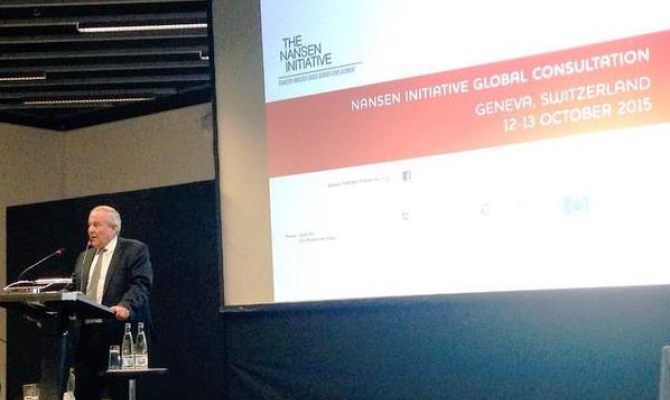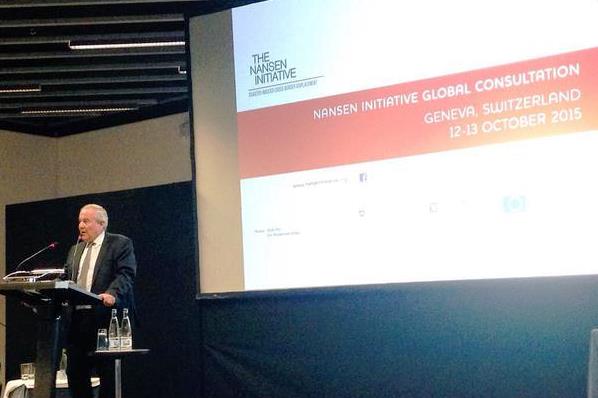
Climate Change Resilience
"Business as usual is unacceptable for the countries of the Pacific island region," was the message from a global forum on the displacement of persons and communities from natural disasters and climate change.
The Secretariat of the Pacific Regional Environment Programme (SPREP) is a key partner to the Nansen Initiative's Global Consultation which brought together over 112 countries in Geneva to address movement of people in response to climate change and natural disasters and to discuss a Protection Agenda for displaced people.
"Business as usual is unacceptable for the countries of the Pacific island region. These countries are strengthening approaches to adapt to climate change and, in some cases, giving serious consideration to the possibility of future relocation of entire communities," said Mr. David Sheppard, Director-General of SPREP in his statement to over 300 delegates attending the Nansen Initiative Global Consultation.
"What is clear is that "no one size fits all" - decisions on this matter are entirely a matter for the Governments of each country and a range of approaches will need to be applied depending on the policy and development agenda of each country."
 Mr. David Sheppard, presenting at the Nansen Initiative Global Consultation
Mr. David Sheppard, presenting at the Nansen Initiative Global Consultation
The Pacific island region has four of the six lowest countries in the world with the highest point in each of these countries ranging between two to four meters above sea-level. This along with the projections of the Fifth Annual Report of the Intergovernmental Panel on Climate Change, and the environmental change being observed by Pacific islanders, has prompted a call for ambitious reductions in greenhouse gas emissions across the globe.
"It is essential that the Climate Convention Meeting in Paris later this year agrees the strongest Legally Binding Agreement to limit Greenhouse Gas Emissions. Pacific island countries have called for emission reductions which will limit global warming to 1.5 degrees above pre-industrial levels," said Mr. Sheppard.
The Nansen Initiative Protection Agenda calls for a strong role for regional organisations in addressing the issue of climate change and natural disasters, including any migration of peoples.
"SPREP welcomes an open and frank discussion of these issues and stands ready to support the priorities of our Pacific members as they adapt and respond to a changing climate and natural disasters."
The Nansen Initiative's Global Consultation took place on 12-13 October in Geneva, over this period Mr. Sheppard also moderated the Thematic Panel on Managing Disaster Displacement Risk in the Country of Origin.
The High level panellists included the Prime Minister of the Cook Islands the Hon. Henry Puna, and Ministers from Vietnam, the Philippines and Bangladesh.
Over 300 people from 112 country delegations, Intergovernmental Organisations, Non-governmental Organisations attended the Nansen Initiative's Global Consultation that was established by Governments of the Swiss Confederation and the Kingdom of Norway.
For more information on the Nansen Initiative please visit: https://www.nanseninitiative.org
For more information on the Nansen Initiative's Global Consultation please visit: https://www.nanseninitiative.org/global-consultations/
The Secretariat of the Pacific Regional Environment Programme (SPREP) is a key partner to the Nansen Initiative's Global Consultation which brought together over 112 countries in Geneva to address movement of people in response to climate change and natural disasters and to discuss a Protection Agenda for displaced people.
"Business as usual is unacceptable for the countries of the Pacific island region. These countries are strengthening approaches to adapt to climate change and, in some cases, giving serious consideration to the possibility of future relocation of entire communities," said Mr. David Sheppard, Director-General of SPREP in his statement to over 300 delegates attending the Nansen Initiative Global Consultation.
"What is clear is that "no one size fits all" - decisions on this matter are entirely a matter for the Governments of each country and a range of approaches will need to be applied depending on the policy and development agenda of each country."
 Mr. David Sheppard, presenting at the Nansen Initiative Global Consultation
Mr. David Sheppard, presenting at the Nansen Initiative Global ConsultationThe Pacific island region has four of the six lowest countries in the world with the highest point in each of these countries ranging between two to four meters above sea-level. This along with the projections of the Fifth Annual Report of the Intergovernmental Panel on Climate Change, and the environmental change being observed by Pacific islanders, has prompted a call for ambitious reductions in greenhouse gas emissions across the globe.
"It is essential that the Climate Convention Meeting in Paris later this year agrees the strongest Legally Binding Agreement to limit Greenhouse Gas Emissions. Pacific island countries have called for emission reductions which will limit global warming to 1.5 degrees above pre-industrial levels," said Mr. Sheppard.
The Nansen Initiative Protection Agenda calls for a strong role for regional organisations in addressing the issue of climate change and natural disasters, including any migration of peoples.
"SPREP welcomes an open and frank discussion of these issues and stands ready to support the priorities of our Pacific members as they adapt and respond to a changing climate and natural disasters."
The Nansen Initiative's Global Consultation took place on 12-13 October in Geneva, over this period Mr. Sheppard also moderated the Thematic Panel on Managing Disaster Displacement Risk in the Country of Origin.
The High level panellists included the Prime Minister of the Cook Islands the Hon. Henry Puna, and Ministers from Vietnam, the Philippines and Bangladesh.
Over 300 people from 112 country delegations, Intergovernmental Organisations, Non-governmental Organisations attended the Nansen Initiative's Global Consultation that was established by Governments of the Swiss Confederation and the Kingdom of Norway.
For more information on the Nansen Initiative please visit: https://www.nanseninitiative.org
For more information on the Nansen Initiative's Global Consultation please visit: https://www.nanseninitiative.org/global-consultations/